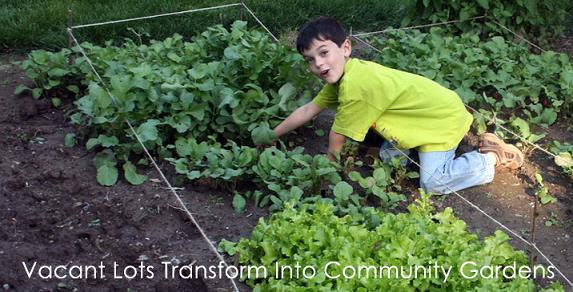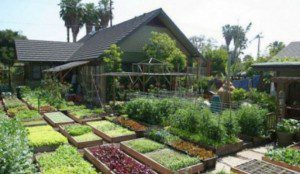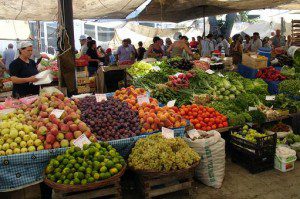Contributing Writer for Wake Up World
When Tiny is Huge: How a Family Produces 6,000 Pounds of Food in Their Back Yard
Just 30 minutes north of Los Angeles in the burbs of Pasadena, California, is a burgeoning tiny farm tucked snugly between three major freeways. For the last decade, the Dervaes family has proven the impossible dream can come true and happily shares the trials and tribulations of their Urban Homestead with the world. Using Laura Ingalls Wilders’ autobiographical Little House children’s stories as a sweet-dream lifestyle, their chosen model for sustainable self-sufficiency is now dubbed: Little Homestead in the City.
The family of four raises more than 350 varieties of fruit, veggies, herbs, and berries on 1/10 of an acre, which translates to a 66′ x 66′ garden space. The tiny farm is also abuzz with bees making honey, while chickens and ducks lay eggs and lend their considerable skills to insect control. Other animals share the farm but are safe since the family has a vegetarian palette.
[pro_ad_display_adzone id=”110028″]
The entire homestead is 1/5 of an acre, and includes their home, outbuildings, and the porch-market for shoppers. All told, the farm yields more than 6,000 pounds of organic food annually.
Aside from their personal consumption, the Dervaes yearly sales top $20,000 in fresh organic food, herbs, and edible flowers to local restaurants. They also host a variety of events and workshops through outreach programs and services to help keep the world and their cash flow moving in the right direction.
“Together we can ignite a revolution of spirit that will truly change our world for the better.” ~ Jules Dervaes
Sowing The Seeds Of Love
A family that grows together, stays together. Emotional scraps dissolve quickly when everyone is too busy to hold grudges. Besides, there’s too much work to do when there’s a farm involved, and it is never a good idea to go to bed hungry or grumpy.
Communal farms have seen a renaissance as thousands of projects are sprouting up like mushrooms all over the planet; the energy channeled into a common cause – let’s eat! Kids and the elderly love being involved and nothing is as soul-satisfying as the holy work of raising food for our families, friends, or the masses.
In Denver, Colorado, Gardens for Growing Healthy Communities is transforming “garbage lots” in the city’s poorest neighborhoods into celestial garden spots. Crime rates drop when beauty arrives, and that’s a fact.
In the U.S. the number of small farms and organic permits is as astonishing as it is resourceful. There are currently nearly 2 million small farms in America, which make up more than 90% of all U.S. farms. Working in concert with the farmers, there are 9,000 Farmers Markets in the states with annual sales exceeding $1 billion.
In Australia, farms produce 93% of the total volume of food consumed in Australia; 60% of the food raised is exported and helps feed 40 million people around the globe every day. In Queensland, agriculture occupies 81% of the state, and in Tasmania 24% of the land is used for agriculture.
Specialty Crops Are Cash Cows
With a small plot of land anyone can turn a pretty penny by cashing in on a specialty crop.

Garlic is nearly impossible to kill. Thriving in poor soil and hot climates, it is drought tolerant and bug resistant, and a necessity for cooks and chefs for everything from soup to nuts.
Americans consume 300 million pounds of garlic per year. Elephant garlic retails for $8 and $6 wholesale per pound, with an average yield around 15,000 pounds per acre. Word is that tiny farms can gross $45,000 per year raising garlic in a half acre backyard or nursery.
Mushrooms are always a hit and can be grown indoors. A 10′ x 10′ garden space could bring a grower $18,000 annually as a supplier for their local markets.
A recent university extension service study found 760 families in one rural county making a decent living with specialty crops on plots averaging 3 acres. At the end of the day there is a plethora of food that is raised on tiny farms feeding the masses these days.
Healing Through Cooperation
Lucky for us we live on the only planet in our solar system that has plants. In a perfect world, all of us would love to be more self-reliant when it comes to nourishing ourselves on all levels.
There has been so much outrage over the poisoning of the world’s food sources through the use of pesticides and GMOs that small gardens are cropping up all over the world at a much faster rate. Sometimes bad stuff makes for a more positive day.
Considering that 150 years ago 85% of the population in the United States were farmers, it makes the modernization of the world and all the subsequent health issues through toxic food consumption look pretty lame and completely unnecessary.
There are plenty of resources “out there” to mobilize our desire to not be a victim of corporate farming. If the Dervaes can do it, anyone can do it.
Starting A Farm Project
Cornell University provides decades of data to help make a start-up farm as error-free and successful as possible right away.
As with anything in life there will be pitfalls along the way, but a few of the more obvious questions to ask and answer are critical. What are the goals? Carefully map out the crop selection and all materials that will be needed. More importantly, spend time on an in-depth study of environmental concerns for the farming area.
The first suggestion is to always start small and literally grow with the farm along the way. Getting back to basics, working the land, and watching the fruits of our labors materialize before our eyes will be challenging, but might be the spiritual experience of a lifetime as well.
The Secret Life Of Plants
If ever there was a heart-opening encounter, it is the fusion of the soul experience with plants and animals.
The Secret Life of Plants by Peter Tompkins and Christopher Bird, never fails to alter the perception of readers and nurtures the deepest respect for our collective home and the diversity of all other life forms.
The alchemy and life-force of these brilliant beings reveals love is the main ingredient to all successful ventures. Plants, like humans, respond in kind. And cooperation, not competition, is the primary component for completion.
No matter how we slice it, a little hard work never killed anyone. Tuning in to the vibration of the planet we live on and literally reaping what we sow is the best way to go through our adventure here.
When there is love involved, plants happily grow for us. It’s what they do! And when we listen in silence to the green machine, the only thing they will ever tell us is Love is the Answer.
No Farm Too Small
Video “No Farm Too Small” courtesy of Oregon State University Extension Service.
[youtube http://www.youtube.com/watch?v=j5Bocu4xjzU]
For more inspiration:
For more inspiration, check out these two articles by Paul Chambers who, along with his wife Sarah, has built a totally sustainable, off-grid eco-house from 2 shipping containers, perched on the top of a mountain in the Australian Bush — Part 1: Living Life Outside The System and Part 2: Adapting to Life Outside the System.
Previous articles by Carmen Allgood:
- The Remedy: Take Love Seriously
- Spiritual Stepping Stones For Profound And Lasting Change
- The Gravitational Pull Of Love
- Download Forgiveness/Upload Happiness
- When Science and Spirituality Collide
- Finding Perfect Love
- The ‘Missing Link’ – All Roads Lead To Love
- Forgiveness: The Ultimate Cleanse
- Giving and Receiving Are The Same
- Why Relationships Bite The Dust … Or Not
- Marijuana On A Legal Roll Worldwide – But Still Singing The Reefer Blues
About the author:
 Carmen Allgood unveils the mysteries of love, reveals the means to heal the mind and thus the body, and the simple steps available to all of us to live in constant joy. The author of the Beyond Diapers – How Not to Wallow in Your Own Poop, a beginner’s guide to inner peace, Carmen offers readers a modern day exploration of spiritual evolution, with a timely twist of pop-psychology for the masses who are starved for lasting peace of mind and true happiness.
Carmen Allgood unveils the mysteries of love, reveals the means to heal the mind and thus the body, and the simple steps available to all of us to live in constant joy. The author of the Beyond Diapers – How Not to Wallow in Your Own Poop, a beginner’s guide to inner peace, Carmen offers readers a modern day exploration of spiritual evolution, with a timely twist of pop-psychology for the masses who are starved for lasting peace of mind and true happiness.
As a radio DJ, Carmen was pioneering the field of support for independent musicians even before there was such a field. Today, she produces syndicated independent music radio shows on WorldWideWavez.com which has featured over 20,000 independent recording artists from around the world. Carmen graces her radio shows and podcasts with a trademark buttery smooth voice and the same inherently encouraging warmth you find in her writing. You can connect with Carmen at TheColoradoWave.com
Image Credits: Urban Homestead, Gardens For Growing Healthy Communities, A Turkish Market.
How to Not Wallow In Your Own Poop
A book by author Carmen Allgood…
Based on a lifelong study of the energy of Love, Beyond Diapers: How to Not Wallow In Your Own Poop is a modern day exploration of our spiritual evolution, delivering a timely twist of pop psychology to a world starved for peace of mind and true happiness.
In this humorous and insightful ‘beginners guide’ to inner peace, Carmen reveals the surefire solution to healing ourselves, and the world, in a cut-to-the-chase simplicity designed to make you laugh your way from forgiveness to love.
Beyond Diapers: How to Not Wallow in Your Own Poop is available here on Amazon.
[pro_ad_display_adzone id=”110027″]










